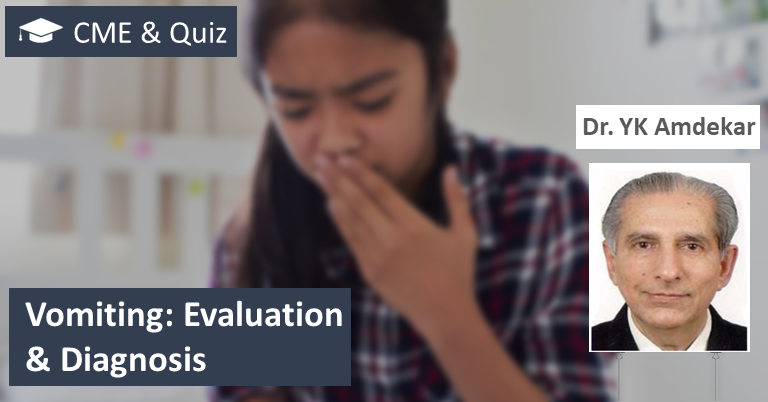Look beyond GI system for vomiting: Dr. YK Amdekar
M3 India Newsdesk May 17, 2019
Summary
Dr. Amdekar in his new CME series & quiz this week, notes that the cause of vomiting may lie in various different organs and not just in the GI system, even though vomit finally comes out of the GI tract. Diagnosis of any underlying condition must be made through thorough history taking.

Before you begin, take the quiz below to test your knowledge.
Vomiting is the involuntary forceful expulsion of contents of stomach and intestine while regurgitation is return of ingested food from stomach into oesophagus and mouth without force. It is important to differentiate one from the other because regurgitation is a common natural event in young infants and should not be confused with vomiting. Nausea is merely a sensation of vomiting and may precede act of vomiting but may not end up with vomiting.
Pathogenesis of vomiting
Vomiting may be a symptom arising from many organs.
- Vomiting due to gastro-intestinal system disorder is caused by obstruction or inflammation in upper GI tract.
- Besides GI disorders, receptors in the floor of fourth ventricle in the brain represents chemoreceptor trigger zone (CTZ) known as area of postrena which if stimulated causes vomiting. CTZ may be stimulated by either raised intracranial pressure or by abnormal metabolites arising from disturbed metabolic functions in the body.
- The autonomic nervous system through its network may also lead to vomiting as may happen in case of acute stress of any kind such as acute cardiac disorder or extreme physical stress and also due to adrenal disorders.
- Stimulation of vestibular part of 8th cranial nerve is responsible for vomiting in motion sickness and stimulation of vagus – 10th cranial nerve due to pharyngeal or gastric mucosal irritation leads to vomiting.
- Drugs also lead to vomiting, in particular, anti-cancer medications.
- A severe bout of cough often ends up in vomiting.
Natural response to vomiting
There is increased salivation as nature’s attempt to protect the enamel of the teeth from coming into contact with acid from the stomach. Retroperistalsis starts from intestines sweeping all the contents upwards with relaxation of the pyloric sphincter.
Intrathoracic pressure lowers with deep inspiration and glottis is closed that prevents aspiration. Intra-abdominal pressure is increased with relaxation of the lower oesophageal sphincter facilitating expulsion of stomach contents. It is often accompanied with sympathetic response leading to sweating and tachycardia.
Contents of vomitus
- Commonly vomitus contains ingested food particles. Once stomach empties after repeated vomiting, all that vomitus contains is just small amounts of mucus.
- Problems arising from obstruction beyond second part of duodenum results in bile stained vomit.
- Repeated attempts to vomit with an empty stomach may cause retching that may also end up with greenish vomit due to forceful expulsion of duodenal contents. Occasionally, such a retching episode injures small blood capillaries in the oesophagus resulting in streaks of blood. It is referred to as Mallory-Weiss tear. It is caused by mechanical force of vomiting and is self-limiting.
- At times vomitus may contain a large amount of blood as commonly happens in the case of oesophageal varices due to portal hypertension.
- Coffee ground vomit indicates that blood has stayed in the stomach for some time before vomiting and is due to iron in the blood getting oxidised.
- Blood in vomitus may also be a result of severe gastritis or in adults due to stomach cancer.
- Faecal vomit may suggest gastrocolic fistula.
Complications in vomiting
Frequent episodes of vomiting may lead to the destruction of enamel of teeth due to acid contact. In young children, aspiration of vomitus is a risk. Severe vomiting may result in dehydration and electrolyte disturbances leading to hyponatraemia, hypochloraemia and metabolic alkalosis. Resultant metabolic alkalosis may cause hypocalcaemia. Persistent vomiting for several days causes malnutrition and constipation.
Red flags in vomiting
Vomiting occurring few days after the onset of other symptoms suggests a serious underlying cause that must be promptly diagnosed and treated appropriately.
On the other hand, vomiting at the onset of the disease generally indicates local upper gastrointestinal problem and is often self-limiting as in case of gastroenteritis. However, persistent vomiting beyond two days in such a scenario indicates serious nature of disease.
Reduced urine output suggests dehydration that needs correction and so also, electrolyte disturbances. Significant abdominal distension may be due to intestinal obstruction or paralytic ileus. Severe abdominal pain indicates either inflammatory or vascular disease. Accompanying neurological symptoms such as headache, drowsiness, or seizures signify serious disease.
Management
It is most important to find out the cause of vomiting that would lead to rational therapy of the disease causing vomiting. However, symptomatic control of vomiting may be tried for the first one or two days. Generally, symptomatic treatment does not work well though vomiting is controlled in benign conditions often on its own.
Hence, it is not rational to continue anti-emetic drugs for more than a few days at most. Ondansetron, perinorm, or domperidone are the drugs used for symptomatic control and rarely injectable form may be used in case of drug not being retained orally. Common side effect of most antiemetic is abnormal movements.
In summary,
- Vomiting occurring few days after onset of other symptoms usually has underlying serious disease
- Vomiting that starts at the onset of disease is usually of gastrointestinal origin and often benign though may continue as well
- Persistent vomiting demands proper evaluation
- Symptomatic treatment is not very effective and should not be continued beyond the first two days; instead demands proper diagnosis and management of primary disease
Disclaimer- The views and opinions expressed in this article are those of the author's and do not necessarily reflect the official policy or position of M3 India.
-
Exclusive Write-ups & Webinars by KOLs
-
Daily Quiz by specialty
-
Paid Market Research Surveys
-
Case discussions, News & Journals' summaries